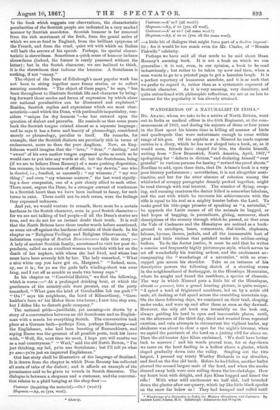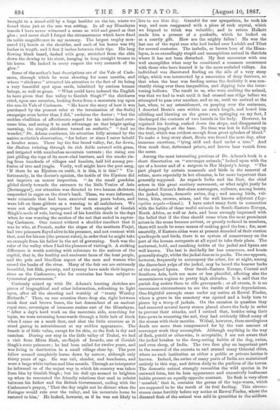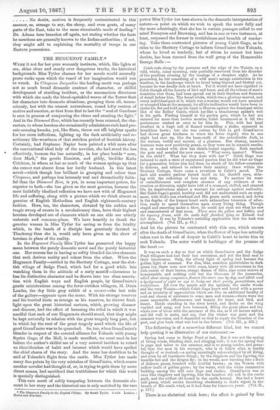WANDERINGS OF A NATURALIST IN INDIA.*
DR. ADAMS, whom we take to be a native of North Britain, went out to India as medical officer in the 64th Regiment, at the com- mencement of 1849, and during his sojourn of three or four years in the East spent his leisure time in killing all manner of birds and quadrupeds that were unfortunate enough to come within range of his gun. Of his exploits as a Nimrod he made copious entries in a diary, which he has now shaped into a book, or, as it would seem, friends have shaped for him, the diarist himself, writing from "New Brunswick, North America, April, 1867," apologizing for " defects in diction," and declaring himself " ever grateful" to various persons for having " revised the proof sheets." Needless to add, upon these data, that Dr. Adams's book is a very poor literary performance ; nevertheless, it is not altogether unat- tractive, and but for the utter absence of cohesion among the whirlwind of scrappy paragraphs densely packed together, might be read through with real interest. The number of flying, creep- ing, and running creatures the doctor killed is somewhat fabulous, and the zest with which he recounts his achievements with the rifle is equal to his zeal as a mighty hunter before the Lord. To make good his title-page promise of speaking as "a naturalist," he appends the Latin names of all the animals he bagged, or had hopes of bagging, in parenthesis, giving, moreover, short descriptions of the scenery through which he passed, so that even the Vale of Cashmere and the Himalayas are noticed as a back- ground to antelopes, bears, cormorants, dial-birds, elephants, falcons, hyenas, ibexes, jackals, and all the innumerable host of great and little victims that perished under his seldom-erring bullets. To do the doctor justice, it must be said that he writes a concise and frequently highly picturesque style, which serves to off wonderfully his hunting ardour, and the excitement ac- companying the " wanderings of a naturalist," with an ever- capped gun across his shoulder. Take as an instance of his, descriptive powers the following sketch of a shooting scene- in the neighbourhood of Serinuggur, in the Himalaya Mountains,, where he sought and found the markhore, a species of chamois- The way in which Nimrod puts a little bit of the Himalayas, almost en passant, into a grand hunting picture, is quite unique.. "I spied a herd of frightened markhore, led on by a noble old male, all dashing at full speed across the crumbling mountain top. On the three following days, we continued on their trail, sleeping under rocks, and were up and after them as soon as day dawned.. However, the wily old buck was invariably on the look out, always guiding his herd to open and inaccessible places, until, on the afternoon of the third day, tired and wearied from repeated exertion, and vain attempts to circumvent the vigilant leader, my shickaree was about to clear a spot for the night's bivouac, when- we espied the patriarch of the herd on a jutting cliff far above us. Then the old hunter Ajez Khan exclaimed, We shall have better luck to morrow ;' and his words proved true, for at day-dawn we came on the herd feeding in a hollow above a glacier, which sloped gradually down into the valley. Singling out the two largest, I pressed my trusty Westley Richards to my shoulder,. and fired on the fine old buck. Before he had fallen, another bullet pierced the second largest male of the herd, and when the smoke cleared away both were seen rolling down the ice-clad elope. How my heart beat with delight, and Ajez Khan hugged and kissed the rifle I With what wild excitement we half slid, half bounded down the glacier after our quarry, which lay like little black specks on the snow far below us 1 They had bumped and rolled until • Wanderings of a Naturalist in India, the Western Himalayas, and Cashmere. R Andrew Leith Adams, M.D. Edinburgh: Edmonton and Douglas. brought to a stand-still by a huge boulder on the ice, where we found them just as the sun was setting. In all my Himalayan travels I have never witnessed a scene so wild and grand as that glen ; and never shall I forget the circumstances which have fixed its noble magnificence in my memory. The largest trophy mea- sured 11* hands at the shoulder, and each of his horns was 48* inches in length, and 3 feet 2 inches between their tips. His long flowing black beard, dashed with grey, stretched from the chin down the dewlap to his chest, hanging in long straight tresses to his knees. He looked in every respect the very monarch of the glen."
Some of the author's best descriptions are of the Vale of Cash- mere, through which he went shooting for some months, and -where "shickaree" attracted his attention to the fact of its being a very beautiful spot upon earth, inhabited by curious human beings, as well as game. "What could have induced the English to have given that fine valley to Goulab Singh?" the shickaree -cried, upon one occasion, looking down from a mountain top upon the sun-lit Vale of Cashmere. " He knew the story of how it was purchased by the present ruler at the termination of the Sutlej campaign even better than I did," exclaims the doctor ; " but the sudden ebullition of affectionate regard for his native land over- came him, and seeing it to such advantage on that bright spring morning, the simple shickaree turned an aesthetic." "And no wonder," Dr. Adams continues, his attention fully aroused by the native ansthetic's observation, "for before or since I never beheld a lovelier scene. There lay the fine broad valley, far, far down, the Jhelum twisting through its rich fields covered with grass, and irrigated with numberless mountain torrents ; the rising sun just gilding the tops of its snow-clad barriers, and the smoke ris- ing from hundreds of villages and hamlets, half hid among pro- fusion of tree and jungle. Verily, well might have the poet sung, ‘If there be an Elysium on earth, it is this, it is this!' " Un- fortunately, in the doctor's opinion, the inside of the Elysium did not improve on nearer inspection. "As the small gondolas glided slowly towards the entrance to the little Venice of Asia tSerinuggur], our attention was directed to two human skeletons suspended in cages on the river's bank. These, we were informed, were criminals that had been executed some years before, and were left on these gibbets as a warning to all malefactors. We were not altogether unprepared for such examples of Goulab Singh's mode of rule, having read of his horrible deeds in the days when he was weaving the meshes of the net that ended in captur- ing Cashmere. One cannot without a shudder recollect that it was he who, at Poonah, under the slopes of the southern Pinjal, had two prisoners flayed alive in his presence, and not content with that, sent for his son (the present ruler), in order that he might take an example from his father in the art of governing. Such was the ruler of the valley when I had the pleasure of visiting it. A striking difference is worth noticing with reference to the natives of the capital, that is, the healthy and sunburnt faces of the boat people, and the pale and bloodless aspect of the men and women who crowd the banks of the river. Many of the fair sex are extremely beautiful, but filth, poverty, and tyranny have made their impres- sions on the Cashmeree, who for centuries has been subject to tyrannical governments."
Curiously mixed up with Dr. Adams's hunting sketches are pieces of biographical and other information, refreshing to light upon, after all the shooting and worship of "trusty Westley Richards." Thus, on one occasion there drop sin, right between musk deer and brown bears, the last descendant of an ancient royal race, sovereigns of immense realms east of the Himalayas. "After a day's hard work on the mountain side, searching for lephe, we were returning homewards through a little belt of birch -when I came on a musk deer, and shot the little creature as it stood gazing in astonishment at my sudden appearance. The female is of little value, except for its skin, as the flesh is dry and tasteless. During our stay in the little valley of Trebel, we had a visit from Mina Shah, ex-Rajah of Iscardo, one of Goulab Singh's state prisoners ; he had been exiled for twelve years, and was living in destitution in a small village close by. The poor fellow seemed completely borne down by sorrow, although only thirty years of age. He was tall, slender, and handsome, and wore a large white turban and blue mantle. Through an interpreter he informed us of the unjust way in which his country was taken from him by Goulab Singh ; but his dull eye seemed to brighten up when he recounted the friendly relations that used to subsist between his father and the British Government, ending with the Cashmeree's prayer, That the day might not be distant when the Feringee would rule over the valley, and his mountain home be restored to him.' He looked, however, as if he was not likely to live to see that day. Grateful for our sympathies, he took his way, and soon reappeared with a piece of rock crystal, which we feigned to think was valuable ; and in return Halkett made him a present of a penknife, which he looked on as a courtly gift. How are the mighty fallen ! He was the last one of the royal race who had lorded over Ladakh and Tibet for several centuries. The isabella, or brown bear of the Hima- layas, is an exceedingly stupid and unsuspicious animal in districts where it has not been disturbed. My first encounter with one well exemplifies what may be considered a common occurrence with those who have hunted it in the more secluded valleys. An individual was discovered feeding on the side of a very steep ridge, which was intersected by a succession of deep furrows, so that when the bear was feeding across the declivity it was con- stantly rising over these inequalities, and dipping into the inter- vening hollows. The result to us, who were stalking the animal, was that we had to wait until it had crossed one ridge before we attempted to pass over another, and so on, until we arrived at the last, when, to my astonishment, on peeping over the eminence, I descried Bruin's ears within an arm's length, and heard him nibbling and blowing on the grass ; so, springing on my feet, I discharged the contents of two barrels in his body. However, he regained his footing, rushed down the slope, and disappeared in the dense jungle .at the base. No time was lost in following up the trail, which was evident enough from great splashes of blood." To make a long story short, Bruin was found the next day, after immense exertions, "lying stiff and dead under a tree." And thus musk deer, dethroned prince, and brown bear vanish from the scene.
Among the most interesting portions of Dr. Adams's book is a short dissertation on " scavenger animals," looked upon with the eye of a hunter and of a surgeon in Her Majesty's Army. " The part played by certain mammals and birds in the removal of refuse, more especially in hot climates, is far more important than generally supposed. As regards India and the East, the chief actors in this great sanitary movement, or what might justly be designated Nature's first-class scavengers, embrace, among beasts, the jackal, hyena, domestic swine, dog ; and among birds, vul- tures, kites, crowns, minas, and the well known adjutant (Lep- toptilos argala—Gmel.). I have noted many facts in connection with the habits of these useful animals in South-Eastern Europe, North Africa, as well as Asia, and been strongly impressed with the belief that if the time should come when the most prominent actors in the scene became extinct, or greatly reduced in numbers, there will needs be some means of making good the loss ; for, most assuredly, if Eastern cities were at present denuded of their carrion quadrupeds and birds, there is no system of conservancy on the part of the human occupants at all equal to take their place. The nocturnal, bold, and sneaking habits of the jackal and hyena are well known. The last is decidedly far less numerous, and hunts - generally singly, whilst the jackal does so in packs. The one appears, however, frequently to accompany the other, for at night, among the discordant yelps of the jackal, may be heard the hoarser barks of the striped hyena. Over South-Eastern Europe, Central and Southern Asia, both are more or less plentiful, affecting also the mountainous regions to pretty high altitudes. It is said that the pariah dog assists them to rifle graveyards ; at all events, it is no uncommon circumstance to see the results of their depredations. One frightful example came under my notice at Rawul Pindee, where a grave in the cemetery was opened and a body torn to pieces by a troop of jackals. On the occasion in question they had removed several heavy stones placed above the body in order to prevent their attacks, and I noticed that, besides using their fore-paws in removing the soil, they had evidently lifted many of the stones with their mouths. Withal, however, these sacrilegious deeds are more than compensated for by the vast amount of scavenger work they accomplish. Although anything in the way of flesh, putrid or otherwise, is acceptable, I am not aware that the jackal betakes to the dung-eating habits of the dog, swine, and even sheep, of India. The two first play an important part in the removal of the excreta in and around many Oriental cities, where no such institution as either a public or private latrine is known. Indeed, the swine of many parts of India are maintained entirely in this way, and driven daily to the purlieus of the towns. The domestic animal strongly resembles the wild species in its outward form, but its lean appearance and excessively loathsome habits present an equally opposite contrast. Its flesh is very often ' measled,' that is, contains the germs of the tape-worm, which are supposed to be the result of its foul feeding. This circum- stance came forcibly before my notice at Rawul Pindee, where the diseased flesh of the animal was sold in quantities to the soldiers. No doubt, mutton is frequently contaminated in this
manner, as, strange to say, the sheep, and even goats, of many parts of the East, take to the same abominable mode of feeding." Dr. Adams here branches off again, not stating whether the facts he mentions are generally known to the Indian authorities ; if not, they .might add to explaining the mortality of troops in our Eastern possessions.
































 Previous page
Previous page